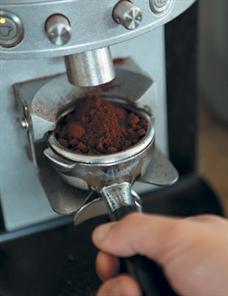Even if you’re an aficionado who knows your macchiato from your Americano, you can brush up on the latest trends and true artisanal coffee brewing, tasting and drinking at Colombo Tea & Coffee Co. in Durban
TRACY GIELINK
Located in the light industrial (but easily accessible) area of Gale Street, this fourth-generation family business has thrown off the shackles of old-fashioned tea supplier to embrace contemporary coffee culture. However, the company’s mission statement of 1917 remains, "To never compromise on the value of fine tea and coffee and cocoa, and to spread our love of these fine beverages to all that we come into contact with."
And spread the love, they do… The mocha revolution has transformed how we socialise.
It has raised consumers’ expectations from a lukewarm filter coffee to a freshly ground, expressed-to-order shot. And
when Kyle Fraser joined forces with Colombo to rebrand, the company was given a blast of fresh air. Together with finance director Victor Richardson, whose grandmother remains the majority shareholder, they redirected the company’s focus to coffee.
The energy exuded by the dynamic young team on the floor – which incorporates the coffee roastery and The Factory Café – is tangible and fuelled by passion rather than a caffeine kick.
The morning begins with a cupping ceremony, where Kyle and his coworkers face a row of glass tumblers, a bowl of water and spoons. They watch closely as a shot of about eight grams of ground coffee (the fragrance is duly noted) is carefully topped with 180ml to 200ml of water heated to 94,5°C.
This method of tasting is not a preparation technique associated with drinking coffee, but is a full immersion brew similar to French press coffee. The clock is set and as time passes the coffee grounds rise to the top of the coffee, creating the crust. This crust is broken with a spoon after precisely three minutes of brewing, presenting a single opportunity to take in the aroma that is released. After a brief stir, the coffee grounds sink to the bottom of the cup, the scum (indissolvables like ethers and oils) is then removed and the coffeetasted in a quick slurp from a spoon. The ceremony provides a quality control measure as every coffee that is roasted for The Factory Café, the Apothecary (Colombo’s retail outlet) or any other large client is tasted.
In fact, in sourcing new coffees and suppliers and receiving a new delivery of beans, Kyle undertakes the same cupping
process. He spent two weeks in Burundi plus time in Kenya meeting a few of the farmers that Colombo sources coffee
from. “I’d rather pay an exceptional price for an exceptional coffee and have a direct relationship,” says Kyle of sourcing from smaller coffee farmers.
An entire season’s crop of beans purchased from micro-lots and co-ops all over the world is delivered every three months and stored in a Joburg warehouse as the climate is more suitable. Deliveries are regularly made to the Durban warehouse and coffee shop patrons can wander across the premises to find hessian sacks filled with green beans patiently waiting to be roasted. Colombo’s beans are available commercially as well as to individual coffee drinkers. Kyle modestly describes Colombo as a coffee education company and runs hands-on beginner, advanced and home barista courses. His headbarista also runs a cupping course and coffee tasting on the first Saturday of every month (R100 per person and booking is essential).
Colombo Tea & Coffee Co., 369 Gale Street, Durban. Call 031-205-3283 or visit www.colombo.co.za.
SOURCES
CLINTON FRIEDMAN

